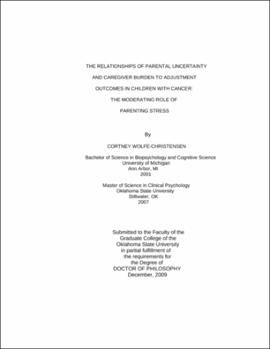| dc.contributor.advisor | Mullins, Larry L. | |
| dc.contributor.author | Wolfe-Christensen, Cortney | |
| dc.date.accessioned | 2013-11-26T08:27:48Z | |
| dc.date.available | 2013-11-26T08:27:48Z | |
| dc.date.issued | 2009-12 | |
| dc.identifier.uri | https://hdl.handle.net/11244/6990 | |
| dc.description.abstract | Scope and Method of Study: The current study sought to determine whether levels of parental uncertainty and caregiver burden, as reported by parents of children with pediatric cancer, were related to the child's emotional, behavioral, and social functioning. Additionally, the moderating role of parenting stress in these relationships was investigated. Data were collected from 46 parents of children on treatment for cancer at the time of participation. Parents completed the Parental Perceptions of Uncertainty Scale, the Care of My Child with Cancer Scale, the Parenting Stress Index, and rated their child's functioning using the Behavior Assessment System for Children -- 2nd Edition and the Social Skills Rating Scale. | |
| dc.description.abstract | Findings and Conclusions: Results indicated that contrary to expectations, neither levels of parental uncertainty nor levels of caregiver burden were significantly related to the child's emotional, behavioral, or social functioning. Additionally, although parenting stress did not moderate the relationships between parental uncertainty and child adjustment, level of parenting stress emerged as a significant independent predictor of the child's emotional and social functioning. Moreover, parenting stress did not moderate the relationship between caregiver burden and child adjustment in the total sample of parents, but did moderate the relationship between caregiver burden and child emotional functioning in the subset of mothers only. Specifically, children evidenced better emotional adjustment under conditions of high caregiver burden and low parenting stress, and poorer emotional adjustment under conditions of low caregiver burden and low parenting stress. It is suggested that mothers who are evidencing higher level of burden due to their hands-on involvement in the child's treatment and care, but are not overwhelmed by the situation (i.e., report lower stress), have children who are better adjusted with regard to their emotional functioning. On the other hand, mothers who reported low levels of both caregiver burden and parenting stress may be distancing themselves from the situation of the child's illness, and therefore distancing themselves emotionally from their child, which could result in the child feeling isolated, sad, withdrawn, or worried. | |
| dc.format | application/pdf | |
| dc.language | en_US | |
| dc.rights | Copyright is held by the author who has granted the Oklahoma State University Library the non-exclusive right to share this material in its institutional repository. Contact Digital Library Services at lib-dls@okstate.edu or 405-744-9161 for the permission policy on the use, reproduction or distribution of this material. | |
| dc.title | Relationships of parental uncertainty and caregiver burden to adjustment outcomes in children with cancer: The moderating role of parenting stress | |
| dc.contributor.committeeMember | Chaney, John M. | |
| dc.contributor.committeeMember | Page, Melanie C. | |
| dc.contributor.committeeMember | Callahan, Jennifer L. | |
| dc.contributor.committeeMember | Winterowd, Carrie L. | |
| osu.filename | WolfeChristensen_okstate_0664D_10602.pdf | |
| osu.accesstype | Open Access | |
| dc.type.genre | Dissertation | |
| dc.type.material | Text | |
| dc.subject.keywords | adjustment | |
| dc.subject.keywords | caregiver burden | |
| dc.subject.keywords | parenting stress | |
| dc.subject.keywords | pediatric oncology | |
| thesis.degree.discipline | Psychology | |
| thesis.degree.grantor | Oklahoma State University | |
